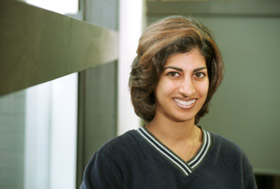
PHOTO: OWEN EGAN
Nasreen Jessani: MISiN nothing
When Nasreen Jessani was a little girl growing up in Kenya, she recalls her grandfather talking about McGill University as a place to aspire going to, a place with a reputation both for the quality of education it provided and for the warmth of its welcome to international students.
Years later, Jessani finds herself not only at McGill, but playing an active role in providing that friendly welcome to non-Canadians as the president of the McGill International Students' Network.
"My grandfather, who didn't go to any university, knew of McGill," says Jessani, who is in her fourth year in a BSc program, majoring in anatomy and cell biology, with a minor in psychology.
Jessani began working with the MISN last year as vice-president, communications. She sought the presidency last year with a few ideas in mind for improving the lot of the University's 3,000 international students.
For instance, one of her priorities is finding a housing solution for exchange students who number roughly 400 annually. Because these students stay only four months, they frequently have trouble finding accommodation.
Working with Off Campus Housing and the Student Exchange Office, Jessani hopes to enlist the "buddy system," whereby recent arrivals are matched with well-settled students, to help such students find accommodation. She also plans to lobby nearby landlords to offer short-term leases.
Her work on this dossier has impressed Pauline L'Ecuyer, the International Student Adviser. "I've met lots of students with great ideas and projects, but she realizes them fast; she's very pro-active," says L'Ecuyer.
Fostering communication seems to be one of Jessani's strong points. Last year, for instance, she initiated the newsletter MISiNformed, to keep MISN members abreast of information. A glance through the current issue reveals articles on the Network's new home in the new student services building, a regular advice column penned by L'Ecuyer, a page on culture and events listings.
Winter events, such as skating at the Bell Amphitheatre and planned trips to the winter carnivals in Quebec and Ottawa, figure in the list.
"We try to give people Canadian experiences," says Jessani, who has become an enthusiastic floor hockey player since coming to McGill -- she played field hockey in Kenya as a child, and, later, in the United Arab Emirates, where her family moved when she was a teenager. She has also become an avid skier.
Still, Jessani recognizes that adapting to this culture, this climate and this distance from home is harder for some international students than for others. While Jessani herself is Kenyan-born, she lived in Canada for a few years when she was a toddler. Her mother's family lives in Alberta. "I suffered no culture-shock nor weather-shock," she laughs.
Many members of the MISN "are like me" and have some previous Canadian experience, she says. There are also members who are not international students but who join MISN out of an interest in helping the newcomers and in learning about a whole slew of countries. Among McGill's roughly 3,500 international students, 145 countries are represented.
Next year, Jessani hopes to find herself doing volunteer work in the health field, in some corner of the developing world. Last year, while working in Pakistan teaching children how to read, she caught the bug for development work.
She enjoyed the experience of rubbing against the realities, as opposed to the stereotypes, of people from other cultures. The people she encountered found Jessani to be something of a revelation as well.
In the village in northern Pakistan, for instance, "They couldn't believe that we [of Indian origin] could speak French and English so well and they couldn't believe that [Canada's] prime minister is not Muslim," chuckles Jessani, herself a Muslim of the Ismaili community.
"It's amazing the questions you get, which is why it's so important to work or travel internationally."
Bronwyn Chester
Bronwyn Chester
| 


